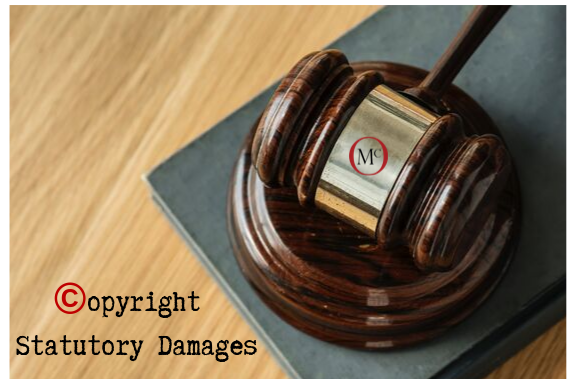
One of the greatest advantages of a Registered copyright is the ability to have, in fact is a requirement, that statutory damages be awarded. A Registration also makes attorney’s fees much more likely. Under the Copyright Act, 17 USC §§501 et seq., creators of original works of authorship including literary, visual, dramatic, musical, and artistic works are given certain exclusive publication, distribution, and usage rights. When these rights are infringed, the copyright owner is entitled to damages.
How does a Court determine monetary damages resulting from an infringement?
Money damages in copyright infringement actions are commonly awarded under some combination of three legal theories: (i) actual damages; (ii) profits; or (iii) statutory damages.
Like all litigation, copyright litigation is both time-consuming and can get very expensive. One of the thornier issues in a copyright infringement action is demonstrating and calculating damages, particularly actual damages and lost profits.
Statutory Damages
As a result, the Copyright Act specifically provides for a third non-discretionary option known as statutory damages. Statutory damages are required to be awarded if an infringement is demonstrated. However, only a person who has a Registered copyright with the U.S. Copyright Office before the infringement, or at least for a period of time encompassing the infringement, may receive statutory damages. A plaintiff in an infringement action may opt for either actual damages (and the infringer’s profits, if appropriate) or statutory damages, but not both.
Statutory damages are damages that are required to be awarded by a judge or jury to a copyright owner in a copyright infringement suit. They are called “statutory damages” because the range of damages is established by the statute, specifically section 504 of the Copyright Act. Statutory damages are usually between $750 and $30,000 per work, as determined by the court. However, the damage amount can be increased up to $150,000 per work if the infringement is found to be willful, in other words, the infringer knew he was infringing upon someone else’s copyrighted works.
The Range of Damages
Section 504(c)(1) of the Copyright Act provides that statutory damages normally range from $750 to a maximum of $30,000. However, Section 504(c)(2) states that willful infringers may be assessed damages of between $750 and $150,000 per work. Section 504(c)(2) also states that innocent infringers risk damages of not less than $200 per work – but “innocent” infringement is rarely found and if there is a copyright notice on the work a claim of innocence cannot be made. See 17 U.S.C. §401(d); Matthew Bender & Co. v. West Pub. Co., 240 F.3d 116, 123 (2d Cir. 2001).
Willfulness Defined
While “willfulness” is not defined in the Copyright Act, Courts typically find willfulness where the defendant knew, had reason to know or recklessly disregarded that its conduct constituted copyright infringement. See Island Software & Computer Serv., Inc. v. Microsoft Corp., 413 F.3d 257, 263 (2d Cir. 2005). Willfulness is almost always found where a defendant continues to infringe a work after a Court Order against such infringement has been entered. See Kepner-Tregoe, Inc. v. Vroom, 186 F.3d 283, 288-89 (2d Cir.1999) (Maximum statutory damages awarded where defendant “chose to ignore the injunction” [prohibiting continuing use of the infringing program]). Willfulness will also likely be found where defendant ignores a cease and desist letter. See Getaped.Com, Inc. v. Cangemi, 188 F. Supp.2d 398, 402-03 (S.D.N.Y. 2002) (“Moreover, defendants’ infringing activities continued despite notice from Getaped. This evidence provides sufficient support for a finding that defendants’ acted in reckless disregard of plaintiff’s rights.”).
Such a finding of “willfulness” has other useful implications, particularly in bankruptcy proceedings. Section 523(a)(6) of the Bankruptcy Code provides that an individual debtor may not discharge a debt “for willful and malicious injury by the debtor to another entity or to the property of another entity.” To determine whether a debtor may discharge a particular debt under that section, bankruptcy courts analyze two separate and distinct issues: “willfulness” and “maliciousness.” A “willful” injury under § 523(a)(6) is a “deliberate or intentional injury, not merely a deliberate or intentional act that leads to injury.” Kawaahau v Geiger, 523 U.S. 57 (1998).
As such, a determination of willfulness, particularly in the face of a Court Order, is very likely to be enough to make such an award of Statutory Damages non-dischargeable in bankruptcy as well. We recommend keeping both the copyright definition of willfulness and the bankruptcy definition well in mind when pursuing a claim for Statutory Damages.
Attorney’s Fees
A copyright Registration also entitles a Plaintiff to an award of attorney fees. Moreover, a determination of willfulness all but guarantees such an award of attorney fees. See Virgin Records Am., Inc. v. Thompson, 512 F.3d 724, 726 (5th Cir. 2008) (recognizing attorney’s fees routinely awarded in copyright cases). The Virgin Records court noted that the grant of attorney’s fees in copyright cases is “the rule rather than the exception.” 512 F.3d at 726.
In short, a Copyright Registration is a valuable asset for a variety of reasons. It is a prerequisite to filing an action in Federal Court, it entitles you to an award of damages and attorney fees, and it allows for an award of statutory damages, a clearly defined remedy for victims of infringement without the murkiness and uncertainty of the first two categories of damages in a copyright infringement case.

